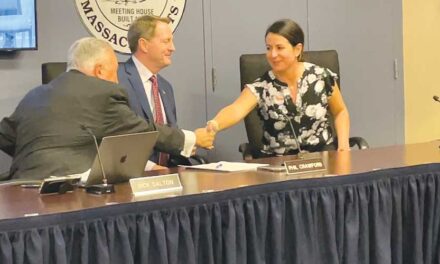Published April 7, 2021

By DAN TOMASELLO
LYNNFIELD — The school system’s four adjustment counselors offered parents some back-to-school advice during a recent School Committee meeting.
Superintendent Kristen Vogel invited the counselors to the meeting in order to help parents and students gear up for the return of full-time in-person learning, which began on Monday.
Summer Street School adjustment counselor Heather Hunt gave an overview of the different types of behavior parents and educators might see once full-time in-person learning begins. She said elementary students often have a difficult time discussing what makes them feel anxious.
“It may manifest in physical symptoms such as headaches, stomach aches and difficulty sleeping,” said Hunt. “It is completely understandable considering the big transition. For some students, it has been over a year since they were inside the building and there are other students who are going to be back in the classroom with double the amount of kids than the first half of the year.”
Hunt said the return of full-time in-person learning is going to be a “big adjustment” for elementary students.
“Students may have difficulty paying attention and may also feel they are not getting enough attention because there are more students in the classroom,” said Hunt. “There may be some work avoidance if students feel it is too hard or overwhelming. Students may also experience feelings of anxiety.”
Hunt also noted that students might refuse or resist going back to school.
“There might be behavioral outbursts such as destroying things and throwing things because elementary students are unable to verbalize how they are feeling,” said Hunt.
Hunt also acknowledged that students might have decreased stamina because they have not been in school five days a week for over a year.
“Students are going to be exhausted, especially at the end of the week,” said Hunt. “That is okay because students have to build their stamina. When the first graders came back, they were tired at the end of the week. That is okay. The students will start getting used to it.”
Hunt also said elementary students might have emotional dysregulation symptoms such as crying or being emotionally withdrawn.
“It’s important to help children label their feelings in order to build their emotional vocabulary,” said Hunt.
Lynnfield High School adjustment counselor Kristen Dee said the secondary schools’ students might send a text message or an email to their parents asking to be picked up from school because they don’t want to be there.
“We know that going back to school will be good for students, but many kids might have some apprehension,” said Dee. “At the middle school and high school, we have seen an increase in the number of students’ texting or emailing their parents this year. We expect parents will be receiving more of these texts.”
Dee said social anxiety is another concern facing secondary school students.
“Some kids haven’t seen a lot of their classmates in over a year,” said Dee. “It might be a little bit uncomfortable at first. Students are also used to a really small classroom and having a larger classroom might be uncomfortable for students.”
Dee also said secondary students might experience moodiness and become withdrawn. She also said students might be exhausted and need to rebuild their stamina similar to elementary students. She also said students may have difficulty sleeping and might use alcohol and drugs as a coping mechanism.
“Some kids start using substances during times of stress,” said Dee.
Dee encouraged parents to “be consistent” with their children. She urged parents to give students time to “adapt to school expectations and demands.”
“We have to be patient with them and understand this is a big change and a big adjustment,” said Dee. “It’s important for students to normalize their feelings and let them know they can expect some anxiety and uncomfortable feelings. That is okay.”
Huckleberry Hill School adjustment counselor Gabriela Brennet said it’s important for parents to develop predictable routines for children such as a morning or bedtime schedule.
“But we also know that plans and routines can change,” Brennet added. “It’s important to encourage flexibility, especially with younger students.”
While Brennet said parents should “validate” their children’s feelings, she said its important for parents to make sure their children come to school every day. She also encouraged parents to use positive reinforcement.
“Children want to do well and want to please people,” said Brennet. “Children are going to need to feel that motivation factor to do well.”
Brennet encouraged parents to continue being role models to their children.
“We know that children are like sponges,” said Brennet. “The more parents can show their children how to work through uncomfortable feelings and show them what tools and strategies they use, children will pick up on that. That will be very helpful.”
Brennet also encouraged parents to have their children acknowledge and validate their worries. She also noted that schools use a “calm down space,” and said parents can try the same technique at home.
“Sometimes children need a break to regulate their emotions,” said Brennet.
Lynnfield Middle School adjustment counselor Marissa Botta said it’s important for parents and teachers to teach students different techniques to help them learn how to stay calm. She also said its important for parents to give students space if they feel unhappy or grumpy.
“We know that transitions are really hard,” said Botta. “Our reactions can either heighten a situation or can help de-escalate it. It’s important for kids not to dwell on negativity and to focus on the positives.”
Botta said it’s important for students to talk to a trusted adult in a school if they are struggling. She also said parents can use a technique recommended by psychotherapist Lynn Lyons called reminder bridges, which is used to help children connect to past successes.
“It reminds children they can power through,” said Botta.
Vogel encouraged parents to ask their children about a good thing that happened in their day.
“This was a practice I used with my own children every single night,” said Vogel. “Sometimes I got silence and sometimes I got some good stories. It changes their mindset and how they think about their experiences. It’s important to look at the positives instead of dwelling on the negatives. There are good things that happen to children in school every day.”
The School Committee thanked the four counselors for giving a thorough presentation. Chairman Jamie Hayman recalled that school officials have worked to add all four adjustment counselors over the last several years.
“We are very fortunate that the town has supported these requests,” said Hayman.
School Committee member Phil McQueen recalled that both elementary school principals informed him last year they were spending a significant amount of time dealing with students’ social-emotional issues. He asked how adding Brennet and Hunt have benefited both schools.
“This year would have been so much harder without them,” said Summer Street School Principal Dr. Karen Dwyer.
In response to a question from Hayman, Dee said it’s important for people to talk about mental health in order to erase the stigma surrounding it. She recalled that a number of celebrities have recently opened up about their struggles with mental health.
“The more that we can normalize it and talk about it, the better,” said Dee.




